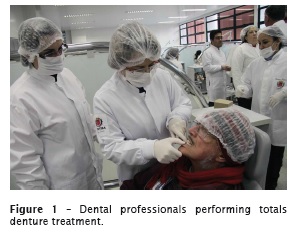Serviços Personalizados
Artigo
Links relacionados
Compartilhar
RSBO (Online)
versão On-line ISSN 1984-5685
RSBO (Online) vol.11 no.3 Joinville Jul./Set. 2014
Short Communication
The role of the university and post-graduation courses in improving health and life of quality of the society
Juliana Feltrin de Souza I; Leonardo Fernandes Cunha I; Eduardo Christiano Morais II; Eduardo Pizzatto I; Jessica Vavassori de Freitas I; Wellington Zaitter II; Flares Baratto-Filho I
I Department of Dentistry, Program of Professional Master Course in Dentistry, Positivo University – Curitiba – PR – Brazil
II Department of Dentistry, Positivo University – Curitiba – PR – Brazil
ABSTRACT
The relationship between health systems and higher education is of fundamental importance to establish oral health improvements for population. Currently, primary attention's goal is to determine the quality of life of a given population through total denture rehabilitation. Thus the aim of this study was to report the integrated actions between the Health Secretary of the city of Curitiba and the University during the training in Total Denture of primary attention professionals. Fifty dental professional from nine sanitary districts of the city of Curitiba were enrolled in the training. The project comprised theoretical and practical classes during a period of five weeks, from June to July of 2013. More similar actions reinforce the university's role in improving the quality of life of the population and the university integration with public service aiming at updating dental professionals.
Keywords: University; Unified Health System; Total Denture; Community Dentistry.
Introduction
Both the Brazilian health and high-education systems developed with separated guidelines. However, their constitutional role has been to promote the construction of less unequal, fairer, and better nation for all 2. The relationship between these sectors is fundamental to assure improvements in population's health, and consequently, better conditions of the population's life.
Among the university roles stated by the UNESCO Conference held in Paris in 1998 1, the university should contribute to the definition and treatment of problems affecting the well-being of the community in which the university acts. Moreover, the university's mission, through postgraduation programs, should foster the innovation, interdisciplinary and transdisciplinary, basing the orientation of the teaching, research, and extension on society's goals and needs 1,3.
The Brazilian unified health system, guided by guidelines of the Health Ministry and Secretary, aims to improve basic and specialized oral health of the population through Centers of Dental Specialties (CEOs). Currently, the basic attention aims to reinforce the prevention, promote oral health, and recover the social rehabilitation of the population through constructing complete dentures.
The courses of Dentistry and Post-Graduation in Dental Clinics of Positivo University (UP) guided by the Brazilian curricular guidelines aim to achieve the generalist, humanist, critical, and reflexive formation of graduates' profile to act in all levels of attention to health, based on ethical and legal principles and on the comprehension of the social, cultural and economic reality of the population 3. By setting the goals, both courses promote actions aiming at improving the oral health of the population of the city of Curitiba. Among the actions, the partnership between the university and the Health Secretary of the city of Curitiba is emphasized, in which the above-mentioned courses promoted the training (in dental prosthesis) of the dental professionals working in the basic attention of the city, also including the professionals working in the Brazilian Health Programme Strategic Units. Thus, the courses of Dentistry and Master Course in Dentistry through their coordination, professors and students, made available classrooms, clinics, parking lots and materials needed for training. Fifty professionals were enrolled in the training from nine sanitary districts of the city of Curitiba (figure 1).
During the Project, theoretical and practice classes were taught comprising five weeks, starting in June and finishing in July of 2013. The following contents were taught: clinical examination, initial dental impression, functional dental impression, border impression, intraoral records, tooth proof, and installation of prostheses. Twenty-five patients from the health units closest to University received no-cost prosthetic treatment. Both the University's dean and the Secretary of Health of the city of Curitiba participated at the moment of the delivery of the total dentures. After training, nine basic unities (one from each district) were chosen to start constructing total dentures, immediately generating 50 total dentures delivered to the population of the city of Curitiba in primary attention.
The knowledge acquired by the professionals acting in the Health Service of the city of Curitiba during the training in total denture held at university provided dental rehabilitation to the population of the city of Curitiba. More similar actions reinforce the university's role in improving the quality of life of the population.

References
1. Bernheim CT, Chauí MS. Desafios da universidade na sociedade do conhecimento: cinco anos depois da conferência mundial sobre educação superior. Brasília: UNESCO; 2008. [ Links ]
2. Haddad AE, Morita AM. O ensino da Odontologia e as políticas de saúde e de educação. In: Carvalho ACP, Kriger L. Educação odontológica. São Paulo: Artes Médicas; 2006.
3. Pordeus IA, Busato ALS, Pereira JC, Costa LJ, Tortamano N, Costa NP. Aspectos conceituais norteadores da pós-graduação stricto sensu. In: Carvalho ACP, Kriger L. Educação odontológica. São Paulo: Artes Médicas; 2006.
 Corresponding author:
Corresponding author:
Juliana Feltrin de Souza
Rua Professor Pedro Viriato Parigot de Sousa, 5.300
CEP 81280-330 – Curitiba – PR – Brasil
E-mail: julianafeltrin@hotmail.com
Received for publication: March 14, 2014
Accepted for publication: May 10, 2014













